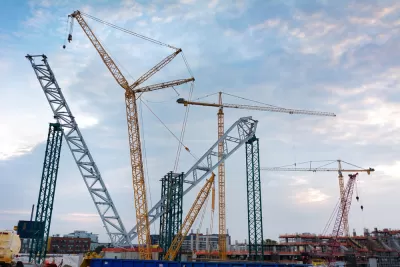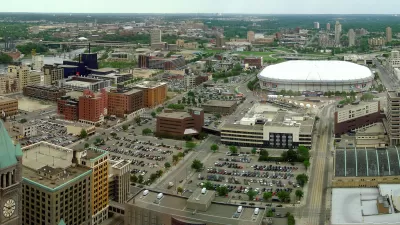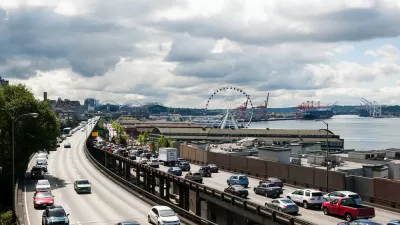Several new developments are adding funds to the pot of money in a streetcar district created by Minneapolis to circumvent a politically unpalatable tax increment financing district.

"About one percent of Minneapolis' tax capacity will be redirected next year toward a fund intended to one day pay for a streetcar line," reports Eric Roper. The streetcar line in question is the 3.7-mile Nicollet Avenue streetcar, which, according to Roper, is still far from certain.
According to Roper, the funding mechanism the streetcar "is hitting its stride as several new apartment towers have opened." But Roper raises the concern that the funds generated by the streetcar district won't be used to help "absorb the growing cost of city services."
"Those buildings now have $5.4 million in city tax capacity, which will aid the streetcar "value capture" district next year rather than helping absorb the growing cost of city services," explains Roper.
Minneapolis' value capture differs from traditional tax increment financing districts, writes Roper, because "Unlike tax increment financing, which pays for development with new taxes generated by that development, the streetcar district redirected taxes from a number of anticipated buildings toward a potential future project."
Roper includes more details about the developments that are now enriching the streetcar district. If the streetcar is to become a reality, the district is expected to pay for about $60 million in debt for the $200 million project.
FULL STORY: One percent of Mpls. tax capacity now aiding streetcar district

Planetizen Federal Action Tracker
A weekly monitor of how Trump’s orders and actions are impacting planners and planning in America.

San Francisco's School District Spent $105M To Build Affordable Housing for Teachers — And That's Just the Beginning
SFUSD joins a growing list of school districts using their land holdings to address housing affordability challenges faced by their own employees.

The Tiny, Adorable $7,000 Car Turning Japan Onto EVs
The single seat Mibot charges from a regular plug as quickly as an iPad, and is about half the price of an average EV.

Seattle's Plan for Adopting Driverless Cars
Equity, safety, accessibility and affordability are front of mind as the city prepares for robotaxis and other autonomous vehicles.

As Trump Phases Out FEMA, Is It Time to Flee the Floodplains?
With less federal funding available for disaster relief efforts, the need to relocate at-risk communities is more urgent than ever.

With Protected Lanes, 460% More People Commute by Bike
For those needing more ammo, more data proving what we already knew is here.
Urban Design for Planners 1: Software Tools
This six-course series explores essential urban design concepts using open source software and equips planners with the tools they need to participate fully in the urban design process.
Planning for Universal Design
Learn the tools for implementing Universal Design in planning regulations.
Smith Gee Studio
City of Charlotte
City of Camden Redevelopment Agency
City of Astoria
Transportation Research & Education Center (TREC) at Portland State University
US High Speed Rail Association
City of Camden Redevelopment Agency
Municipality of Princeton (NJ)




























